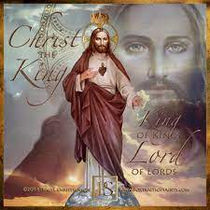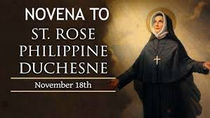The Catholic Defender: Feast of Christ The King
- Donald Hartley

- a few seconds ago
- 4 min read

During the early twentieth century, in Mexico, Russia, and some parts of Europe, militantly secularistic regimes threatened not just the Catholic Church and its faithful but civilization itself. Pope Pius XI’s encyclical gave Catholics hope and—while governments around them crumbled—the assurance that Christ the King shall reign forever. Jesus Christ “is very truth, and it is from him that truth must be obediently received by all mankind”
Christ’s kingship is rooted in the Church’s teaching on the Incarnation. Jesus is fully God and fully man. He is both the divine Lord and the man who suffered and died on the Cross. One person of the Trinity unites himself to human nature and reigns over all creation as the Incarnate Son of God. “From this it follows not only that Christ is to be adored by angels and men, but that to him as man angels and men are subject, and must recognize his empire; by reason of the hypostatic union Christ has power over all creatures”
The Church calls us to acknowledge Christ’s kingship with our whole lives:
He must reign in our minds, which should assent with perfect submission and firm belief to revealed truths and to the doctrines of Christ. He must reign in our wills, which should obey the laws and precepts of God. He must reign in our hearts, which should spurn natural desires and love God above all things, and cleave to him alone. He must reign in our bodies and in our members, which should serve as instruments for the interior sanctification of our souls, or to use the words of the Apostle Paul, ‘as instruments of justice unto God.’
This solemnity encourages us the celebrate and live out our faith in public. “Thus by sermons preached at meetings and in churches, by public adoration of the Blessed Sacrament exposed and by solemn processions, men unite in paying homage to Christ, whom God has given them for their King”
Feast celebrated in the Roman Catholic Church and the Lutheran Church on the last Sunday of the liturgical year. It celebrates Christ's messianic kingship and sovereign rule over all creation.
The Feast of Christ the King, also known as the Solemnity of Our Lord Jesus Christ, King of the Universe, is a Catholic festival that celebrates Jesus Christ as the ruler of all creation:
When it's celebrated
The Feast of Christ the King is celebrated on the last Sunday of the liturgical year, which is usually the last Sunday before Advent.
Who established it
Pope Pius XI established the feast in 1925 in response to the growing secularism and atheism of the time.
in response to growing secularism and secular ultra-nationalism. The feast was assigned the highest rank of solemnity. The liturgical vestments for the day are white.
The feast was created to:
Help strengthen the faithful's faith in Jesus Christ
Remind people that Christ reigns as King forever, even though governments come and go
Encourage Christians to celebrate their faith in both their public and private lives
What it symbolizes
The feast symbolizes that Christ's kingdom is different from traditional kingdoms, and that he will return to establish his kingdom on earth.
Readings for the day often focus on death, final judgment, and God's eternal kingdom.
The Feast of Christ the King has an eschatological dimension, pointing to the end of time when the kingdom of Jesus will be established in all its fullness to the ends of the earth.
His kingship is founded upon the hypostatic union. From this it follows not only that Christ is to be adored by angels and men, but that to him as man angels and men are subject, and must recognize his empire; by reason of the hypostatic union Christ has power over all creatures
The hypostatic union is a Christian theological term that describes how Jesus Christ is both fully human and fully divine in one person
In the most basic terms, the concept of hypostatic union states that Jesus Christ is both fully God and fully man. He is simultaneously perfectly divine and perfectly human, having two complete and distinct natures at once.
This solemnity encourages us the celebrate and live out our faith in public. “Thus by sermons preached at meetings and in churches, by public adoration of the Blessed Sacrament exposed and by solemn processions, men unite in paying homage to Christ, whom God has given them for their King”
Christ the King is one of the most important titles of Jesus. Even though Jesus Christ was not a king in the earthly sense, He is the divine King of the Universe, who unites all of creation with the Father. As St. Paul tells us,
1 Cor. 15:25-28 For [Christ] must reign until he has put all his enemies under his feet. The last enemy to be destroyed is death. For God has put all things in subjection under his feet. . . . When all things are subjected to him, then the Son himself will also be subjected to Him who put all things under him, that God may be all in all.
"Christ Jesus, I acknowledge You to be the King of the universe; all that has been made has been created for You". This prayer also includes renouncing Satan, renewing baptismal promises, and committing to living a Christian life
"By your Holy Spirit, you have united us as one body, called to live as one family of God". This prayer also asks for patience to share burdens, courage to be friends of the truth, and to remain with Christ.
"My glorious King of the Universe, You are perfect in all of Your ways. Your divine Law must reign in my heart and become the purpose of my life". This prayer also includes rededicating oneself to Christ and submitting to his control of life.
Lord our God, You alone are the Most Holy King and Ruler of all nations. We pray to You, Lord, in the great expectation of receiving from You, O Divine King, mercy, peace, justice and all good things. Protect, O Lord our families and the land of our birth. Guard us, we pray, Most Faithful One.



















Comments